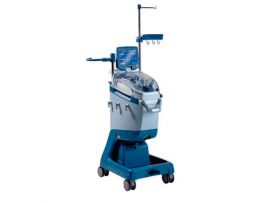Abstract Since the 18th century, bedside rounds have been a fundamental component of clinical care, serving as a setting where clinical information is gathered, processed and shared. This tradition highlights the..
Read MoreAbstract Objectives: Blood lactate concentration ([Lac]b) reflects the balance among production, clearance (Cl[Lac]), and volume of distribution. We have observed dramatic improvement in [Lac]b in critically ill patients after starting support..
Read MoreAbstract Background/Objectives: Allogeneic transfusion is a commonly used method to replace blood and blood elements lost during cardiac surgery, but it also has quite undesirable effects. The use of Cell Saver..
Read MoreAbstract Objectives To ascertain the dosage of bivalirudin in neonates and infants undergoing arterial switch operation on integrated extracorporeal membrane oxygenation–cardiopulmonary bypass (CPB) circuit. Design Pilot study. Setting A tertiary..
Read MoreAbstract Background A systemic inflammatory response can contribute to poor outcomes in an advanced stage of cardiogenic shock (CS). We investigated the efficacy of extracorporeal endotoxin and cytokine adsorption using..
Read MoreAbstract Objective To test the feasibility and effectiveness of implementing the HemoClear microfiltration cell-salvage system for cesarean sections in South Africa. Methods We conducted a prospective experimental single-arm feasibility study..
Read MoreAbstract Background Extracorporeal Membrane Oxygenation (ECMO) is a critical support system for patients with acute and severe cardiac and respiratory failure. This study investigates the impact of different patient body..
Read MoreAbstract Extracorporeal membrane oxygenation (ECMO) provides critical cardiac support, but predicting outcomes remains a challenge. We enrolled 1,748 adult venoarterial (VA)-ECMO patients at the National Taiwan University Hospital between 2010..
Read MoreAbstract Background Normothermic regional perfusion (NRP) and direct procurement and perfusion (DPP) allow for transplantation with donation after circulatory death (DCD) hearts. This study aimed to characterize the use of..
Read MoreAbstract This study investigates the effects of intraoperative cell salvage (IOCS) on cell survival rates, apoptosis levels, and circulating tumor cell (CTC) counts in patients with hepatocellular carcinoma (HCC) undergoing..
Read MoreAbstract Background Donation after circulatory death (DCD) heart transplants have increased in the United States with direct procurement with machine perfusion (DPP) and thoracoabdominal normothermic regional perfusion (TA-NRP) techniques. There..
Read MoreAbstract Rationale: Life-threatening airway obstructions caused by tumors demand prompt and effective intervention. Traditional surgical methods are often complicated by bleeding risks, especially with the use of anticoagulation during extracorporeal..
Read MoreAbstract To explore the challenges and describe the impact of the COVID-19 pandemic on intensive care nurses' experience in providing ECMO care in a high-volume Australian ICU ECMO centre that..
Read MoreAbstract Purpose To build a mock circulatory loop to simulate veno-arterial extracorporeal membrane oxygenation (V-A ECMO) haemodynamics using a patient-specific silicone aortic phantom and compare the flow dynamics for continuous..
Read MoreAbstract Background and Objectives: The aim of this study was to compare the effects of sevoflurane-based anesthesia and propofol-based total intravenous anesthesia (TIVA) on intraocular pressure (IOP) during coronary artery..
Read MoreAbstract This study assesses hemodynamic data and parameter combinations in predicting neurocognitive impairment post-cardiopulmonary bypass graft (CABG) using logistic regression and random forest algorithms. 28 patients underwent the Montreal Cognitive..
Read MoreAbstract Extracorporeal membrane oxygenation (ECMO) is widely recognized as a life-saving measure. The use of veno-arterial extracorporeal membrane oxygenation (VA ECMO) is on the rise, serving as an effective mechanical..
Read MoreAbstract RenOx, a novel artificial lung and kidney assist device, combines gas exchange and dialysis fibers for integrated respiratory and renal support, with dialysis fibers intended for toxin clearance and..
Read MoreAbstract Thyroid storm (TS) is an endocrine emergency requiring aggressive medical management. In severe cases, hemodynamic instability may necessitate extracorporeal membrane oxygenation (ECMO) support as a bridge to definitive surgical..
Read MoreAbstract OBJECTIVES In cardiac surgery patients, acute kidney injury (AKI) frequently occurs in the setting of haemodynamic instability and treatment with temporary mechanical circulatory support (tMCS). Recent evidence suggests amino..
Read MoreAbstract Background Limb ischemia is a serious complication of venoarterial (VA) extracorporeal membrane oxygenation (ECMO), potentially resulting in amputation, rhabdomyolysis, or death. This study aimed to evaluate the effectiveness of..
Read MoreAbstract Background In the Intensive Care Unit (ICU), clinicians frequently make complex, high-stakes judgments, where inaccuracies can profoundly affect patient outcomes. This perspective examines human judgment error in ICU settings,..
Read MoreAbstract Introduction Amino acids (AAs) serve diverse roles, and insufficient delivery is associated with worse outcomes in ill patients. In the case of congenital heart disease (CHD) surgery with cardiopulmonary..
Read MoreAbstract Introduction The aim of this scoping review was to determine what evidence is available regarding the use of the cycle ergometer in the rehabilitation of adult patients undergoing extracorporeal..
Read MoreAbstract Background Surgery-related adverse events are among the most common adverse events in-hospital. However, no comprehensive, multidisciplinary perioperative guidelines exist at the European level. The aim of this study is..
Read MoreAbstract Background Cardiopulmonary bypass use during surgery disrupts microcirculation, which can contribute to lung injury, particularly in patients with pulmonary comorbidities. Continuous transcutaneous carbon dioxide (CO2) monitoring assists clinicians to..
Read MoreAbstract Background: Severe poisoning can lead to catastrophic cardiovascular collapse, often progressing to multiorgan failure and death. While intensive supportive care and pharmacological intervention remain the cornerstone of management, cases of..
Read MoreAbstract Introduction This study aims to describe laboratory and clinical factors associated with thrombotic events during prolonged pediatric extracorporeal membrane oxygenation. Methods A secondary analysis of a multi-center prospective study..
Read MoreAbstract Bleeding complications are frequently observed in patients undergoing extracorporeal membrane oxygenation and are associated with increased mortality. Due to the complex mechanisms, managing bleeding during ECMO remains a challenge...
Read MoreAbstract Aims Crises in the operating room, often resulting from human factors, endangers patient safety. Simulation-based training to develop non-technical skills shows promise in managing these crises. This review examines..
Read More



















